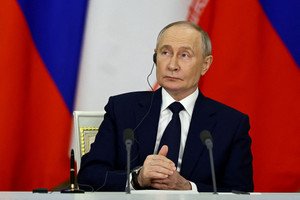Factbox-What are Russia's strategic treaties with Iran, North Korea and China?
Published by Global Banking & Finance Review®
Posted on January 17, 2025
4 min readLast updated: January 27, 2026

Published by Global Banking & Finance Review®
Posted on January 17, 2025
4 min readLast updated: January 27, 2026

Russia's strategic treaties with Iran, China, and North Korea aim to counter Western influence and bolster military and economic ties.
(Reuters) - Russia signed a strategic partnership treaty with Iran on Friday that follows similar pacts with China and North Korea. All three countries are adversaries of the United States, and Russia has used its ties with them to help blunt the impact of Western sanctions and boost its war effort in Ukraine.
Here are some of the key points of the agreements.
RUSSIA-CHINA "NO LIMITS" PARTNERSHIP, 2022
Presidents Vladimir Putin and Xi Jinping met in Beijing on Feb. 4, 2022 and announced a strategic partnership that they said was aimed at countering the influence of the United States and would have "no 'forbidden' areas of cooperation". It was signed 20 days before Putin launched his full-scale invasion of Ukraine.
Moscow and Beijing said their relationship was superior to any Cold War era alliance and they would work together in fields including space, climate change, artificial intelligence and control of the internet. They did not declare a formal military alliance, but have held high-profile joint exercises in the past three years, and Putin has described China as an ally. Bilateral trade, in dollar terms, reached $244.8 billion in 2024, up from $146.9 billion in 2021, and China is a top buyer of Russian oil. The U.S. accuses China of helping to power Russia's war effort in Ukraine by providing it with components used in arms production, such as microelectronics, that it can no longer source in the West because of sanctions.
RUSSIA-NORTH KOREA STRATEGIC PARTNERSHIP, 2024
Putin and North Korean leader Kim Jong Un signed a "comprehensive strategic partnership" pact in Pyongyang on June 19, 2024, including a mutual defence clause in case of aggression against either country. Kim expressed "unconditional support" for "all of Russia's policies", including "a full support and firm alliance" for Russia's war in Ukraine. Putin has said Russia would help North Korea build satellites.
The U.S. and South Korea say North Korea has shipped ballistic missiles, anti-tank rockets and millions of rounds of ammunition for Russia to use in the war. Moscow and Pyongyang have denied weapons transfers.
Ukraine, South Korea and the U.S. say Kim has sent 11,000 troops to fight for Russia in its western Kursk region, part of which has been held by Ukraine since August. Ukraine says many North Korean soldiers have been killed and wounded, and last week said for the first time that it had captured two of them alive. Moscow has never confirmed or denied their presence.
RUSSIA-IRAN AGREEMENT, JANUARY 2025
The deal was signed in Moscow on Friday by Putin and Iranian President Masoud Pezeshkian, who said it would take their relations to a new level across a host of areas including trade, transport and energy. The treaty says the two sides will work together against military threats and take part in joint exercises. It does not contain a mutual defence clause - unlike Russia's treaties with North Korea and Belarus - but says if one country is attacked, the other must not provide any military or other assistance to the aggressor.
There is no specific mention of arms transfers, a topic of particular concern to the U.S. and its allies, but the two sides say they will develop their "military-technical cooperation".
Russia has made extensive use of Iranian drones in the Ukraine war. The U.S. accused Tehran in September of delivering close-range ballistic missiles to Russia for use against Ukraine, which Tehran denied. The Kremlin has declined to confirm it received Iranian missiles, but has acknowledged that its cooperation with Iran includes "the most sensitive areas".
(Reporting by Mark Trevelyan; Editing by Peter Graff)
The article discusses Russia's strategic treaties with Iran, China, and North Korea, focusing on military and economic cooperation.
The treaty with China aims to counter U.S. influence and includes cooperation in space, climate change, and technology.
North Korea signed a mutual defense pact with Russia and is accused of providing military support in the Ukraine conflict.
Explore more articles in the Finance category
